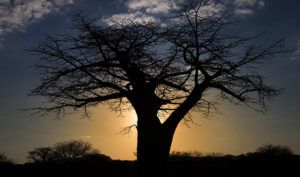Scientists can only see it:
Africa’s oldest baobabs have been increasingly dying over the past decade.

A TREE COLLAPSE IN A DECADE
The study, which was conducted over no less than twelve years of research, describes « an event of unprecedented magnitude ».
« We had been informed of the collapse of the baobab Grootboom in Namibia but we thought it was an isolated event, » says Adrian Patrut, co-author of the study. Between 2005 and 2017, out of sixty specimens studied, « eight of the thirteen oldest baobabs are partially or totally dead. »
So the baobab Sunland collapsed last year. Over 1,000 years old, it attracted curious tourists because it contained a bar in its lair. Panke in Zimbabwe was 2,450 years old… Baobab Chapman of Botswana also ended his life in 2016…

POTENTIALLY RESPONSIBLE GLOBAL WARMING
The death of these historic natural monuments has not yet been explained. Researchers are rejecting the hypothesis of an epidemic and focusing on global warming.
« The region where the millennial baobabs died is one of the fastest warming regions in Africa, » says Patrut. But « larger trees need more water and nutrients than smaller trees, and are the most affected by rising temperatures and drought.
And it would seem that these sudden disappearances are not isolated cases in the world. In Costa Rica, for example, many trees in tropical forests are facing the same fate as African baobabs because of rising temperatures.
However, further research is needed to support this hypothesis. Natural death is unlikely according to researchers because of the multiplication of deaths, but especially because of the long life span of these trees.